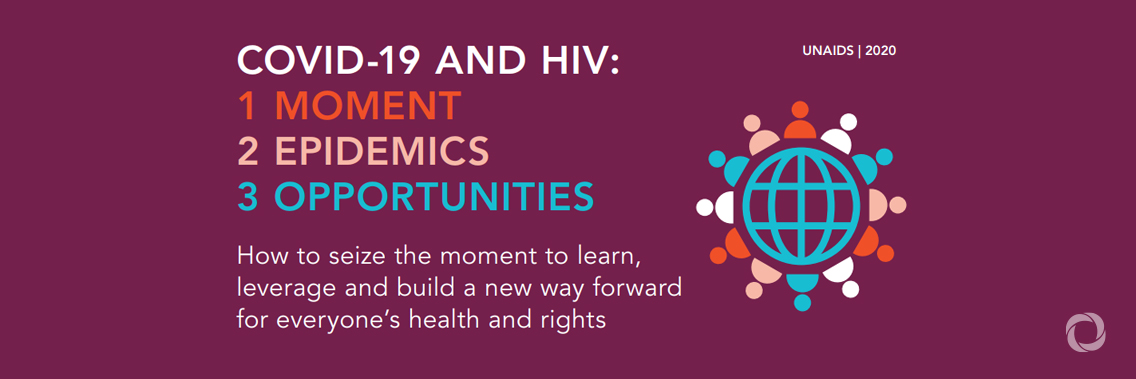A new report from UNAIDS shows how countries grappling with COVID-19 are using the experience and infrastructure from the AIDS response to ensure a more robust response to both pandemics. COVID-19 and HIV: 1 moment, 2 epidemics, 3 opportunities—how to seize the moment to learn, leverage and build a new way forward for everyone’s health and rights shows that by identifying the dynamic changes needed, systems can be found that are effective, inclusive, equitable and sufficiently resourced.
“Given the epic dimensions of the emergency, the world needs unity and solidarity,” said United Nations Secretary-General António Guterres. “Our decades-long fight against HIV offers essential lessons. By heeding those lessons and working together, we can ensure that national health responses deliver on the promise of the 2030 Agenda for Sustainable Development and the health and well-being of all.”
The three opportunities highlighted in the report are: (1) that key lessons learned from the HIV response should inform COVID-19 responses; (2) how the HIV infrastructure is already driving COVID-19 responses and has the potential to catalyse accelerated progress; and (3) how the COVID-19 and HIV responses offer a historic opportunity to build a bridge to adaptable, results-driven systems for health that work for people.
“This is a unique opportunity to reimagine systems for health,” said Winnie Byanyima, Executive Director of UNAIDS. “All eyes are on health, health systems, and health care, with countries wanting to be better equipped to deal not only with COVID-19 but also to create healthier, more resilient societies. We can seize this opportunity by learning from HIV and from COVID-19 to make important changes to develop rights-based, equitable, people-centered systems for health.”
The report highlights how the HIV response can help to jump-start an accelerated response to COVID-19 in ways that can help to ensure that such efforts do not come at the expense of the HIV response or other essential health priorities. At the same time that the world undertakes focused efforts to slow the spread of COVID-19, it must also redouble efforts to limit any interruption and promote rapid recovery of HIV-related services, including ensuring uninterrupted supplies of essential commodities and technologies for HIV and other global health priorities.
The extensive, dynamic and agile infrastructure that has been built up around the HIV response is being leveraged in many ways to assist the response to COVID-19 and includes innovative, community-led service delivery.
The report highlights that although different in many respects, COVID-19 and HIV share important characteristics and that by incorporating key lessons learned from HIV, the response to COVID-19 can avoid many errors. One essential element is the buy-in and leadership of communities. Community activism has sped up the delivery of life-saving HIV medicines, community surveillance has alerted officials to dangerous medicine stock-outs and communities have delivered essential door-to-door HIV testing and treatment services and are leading efforts to strike down punitive laws that drive populations such as gay men and other men who have sex with men, sex workers and people who use drugs away from critical health services.
Systems for health in the future must be prepared to address any new major health crisis by being agile, results-driven, inclusive and people-centered. COVID-19 and the response to HIV should be used as an opportunity to reimagine systems for health that work for people, maximize efficiency and effectiveness, attract sufficient resources and engage communities as essential partners for health.
Original source: UNAIDS

